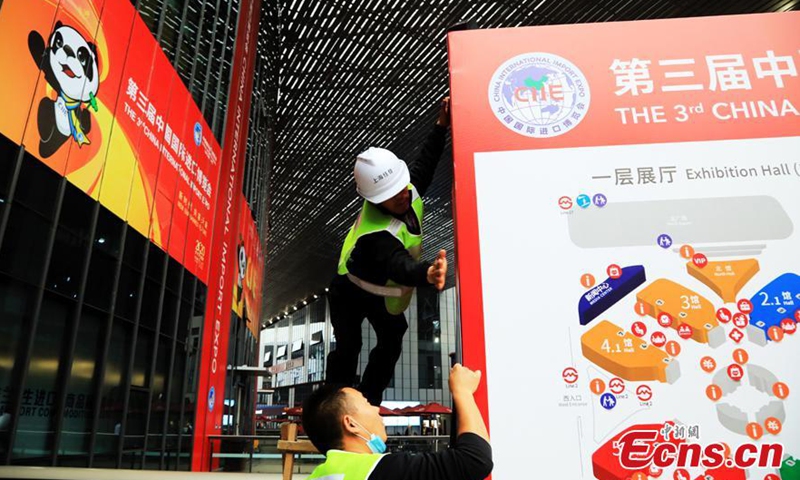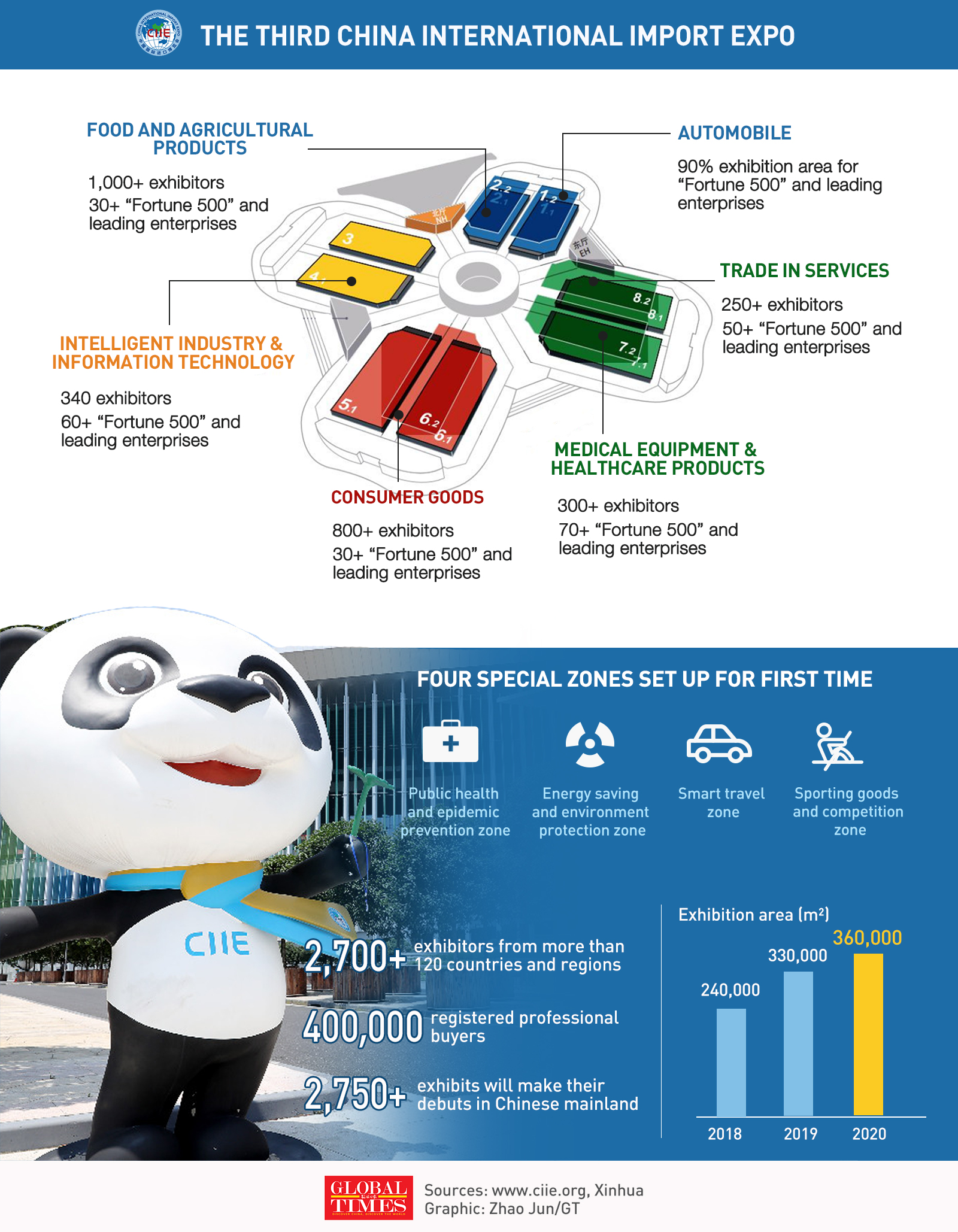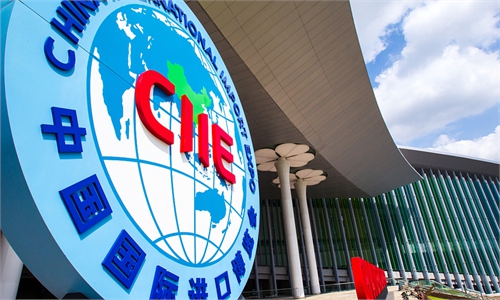CIIE to offer new hope to global businesses
Chinese demand rebounds, but COVID-19 threatens deals: experts

Photo taken on Nov. 1, 2020 shows workers prepare for the opening of the third China International Import Expo (CIIE) which is to be held from Nov. 4 to 10 in Shanghai, east China. (Photo: China News Service/Tang Yanjun)
As many parts of the world--from the US to Europe--suffer fresh waves of the COVID-19 epidemic that could have an even bigger impact on their economies, China is ready to launch one of the biggest trade fairs - the China International Import Expo (CIIE) - on Wednesday, offering foreign businesses a glimmer of hope amid a dark outlook for global trade.
Over 2,000 foreign companies--from pharmaceutical giants in the US to auto behemoths in Germany, to financial services providers in the UK--are eyeing the major import-focused trade fair to showcase their products and expand their businesses in the massive Chinese market that is rebounding rapidly from the pandemic.
While the opening of the expo despite the challenges and hurdles posed by the coronavirus underscores China's resilience and determination to push forward opening and global cooperation, the worsening pandemic could also weigh on the number of deals to be signed, and global trade in the coming months, experts said.

People look at a grand floral display set off by flags, fountains and lights on Tuesday night at the southern square of the National Exhibition and Convention Center, the venue for the 3rd China International Import Expo in Shanghai, a day before the event kicks off on Wednesday. Photo: Yang Hui/GT
Gearing up
The third CIIE will officially kick off on Wednesday in Shanghai. Highlighting the significance of the fair, Chinese President Xi Jinping will deliver a keynote speech at the ceremony via video link, China's Commerce Ministry announced last week. The expo will run from Thursday to November 10.
As part of China's bid to further open up its domestic market to foreign products, the CIIE has become a major platform for global businesses to explore and expand in China. Despite logistical and other hurdles posed by COVID-19, the import fair is expected to see broad participation and major business deals.
"Globalization is encountering a headwind; the international situation faces greater instability and uncertainty, and poses severe challenges for development in all countries. The opening of the CIIE as scheduled will help maintain unimpeded trade and a stable supply chain," UK banking giant Standard Chartered said in a statement sent to the Global Times on Tuesday.
More than 2,700 businesses from over 120 countries and regions are expected to attend the CIIE, according to official CIIE data. While the number of exhibitors dropped slightly from last year's 3,000, the area of exhibition increased from 330,000 square meters to 360,000 square meters this year. On the buying end, about 400,000 professional buyers have registered to participate.
In interviews with the Global Times, many foreign businesses expressed excitement in the event, describing the CIIE as a rare platform for promoting businesses, as much of the world remains under serious anti-virus restrictions.
"CIIE has become a high-profile global platform for sharing opportunities, and we look forward to carrying out deep cooperation with our Chinese partners through this platform," said Zhang Yufeng, president of US conglomerate Honeywell China in a statement sent to the Global Times on Tuesday.
Honeywell is attending this year's CIIE for the third time after receiving fruitful contracts from the previous two expos. This year, Honeywell will present more than 30 innovative technologies and products for safe flights, smart hospitals, smart factories, and smart logistics.
Defying calls for a so-called "China-US decoupling" from some US politicians, 196 US businesses will attend the CIIE, including 58 pharmaceutical firms and 40 consumer goods suppliers. The number of US exhibitors is largely in line with last year's 192. US soybean farmers will also promote soybeans in China. Soybeans and other products covered in the China-US phase one deal could see some major deals at the expo, experts said.
"Those promoting China-US decoupling are politicians who are irresponsible and only seek political gains… the number of US participants shows that businesses are pragmatic," Bai Ming, deputy director of the Ministry of Commerce's International Market Research Institute, told the Global Times on Tuesday.
Aside from the US, strong participation is also seen from all over the world from Europe to Southeast Asia. Denmark, which counts China as the fourth largest market for its food sector, is sending a delegation of 23 food and food-related companies to the expo, according to Danish Minister for Food and Fisheries Mogens Jensen.
The Singapore Business Federation (SBF), which is leading more than 40 Singapore businesses to the CIIE, said that "CIIE 2020 marks the first time since the outbreak of the pandemic that Singapore businesses are participating at an international trade show with such a large-scale showing."

Infographic:GT
Glimmer of hope
"The IMF forecasts that China would be the only major economy to grow after the pandemic. The opportunities in China are unmatched by any other country at the moment," Bai said, adding that the solid recovery in the Chinese economy and consumption means a huge demand for foreign products and services.
The Chinese economy grew by 4.9 percent year-on-year in the third quarter of the year, rebounding from a record 4.9 percent contraction in the first quarter, when the COVID-19 brought the world's second-largest economy to a near standstill. Retail sales also returned to a growth of 0.9 percent year-on-year in the third quarter.
"In the face of the epidemic, China has demonstrated strong resilience and instilled huge opportunities and vitality to the local consumer market with effective epidemic prevention and control measures. Our confidence in the Chinese market has never changed," US food giant Mars said in a statement to the Global Times on Tuesday.
While the CIIE offers a rare glimmer of hope for many foreign companies, with major businesses expected to be signed, the impact of the COVID-19 on global trade was palpable at the CIIE. Many events would be held online to prevent the spread of the virus, and many foreign businesses sent their staff in China to attend the expo instead to avoid global travel.
Authorities in Shanghai have also taken a slew of anti-epidemic measures to ensure the safety of attendees, including deploying mobile COVID-19 facilities at the venue, and imposing strict controls on cold-chained food exhibits. Over 400 medical workers, 12 ambulances, and 33 designated hospitals will be on duty to ensure safety, Shanghai municipal officials said.
The COVID-19 pandemic not only impacts the event in terms of logistics but also in terms of business deals, Bai said. "Because of the special circumstances this year, [business deals] could be impacted by the epidemic," he said, adding that the drop will not be "as significant."
In 2019, intended business contracts worth $71.13 billion were signed during the second CIIE, up 23 percent from the first one, according to official data.
However, the COVID-19 pandemic has also spurred new business trends around the world. The CIIE has set a special area for medical equipment and healthcare products with over 300 companies. In line with demand in the Chinese market, the area for food and agricultural products could be the biggest with over 1,000 exhibitors, followed by one for consumer goods, which has over 800 companies.
"With retail sales returning to growth, China's spending power has also recovered… our demand for foreign products still have a potential [for growth]," Bai said.



